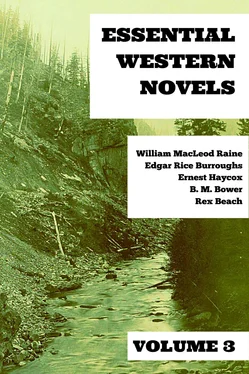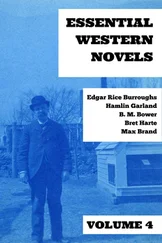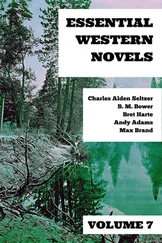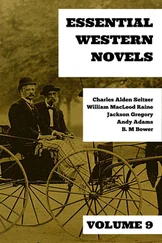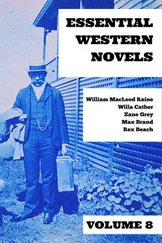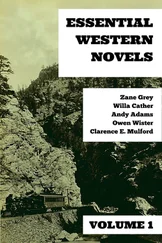1 ...6 7 8 10 11 12 ...40 "Squaw-man" is the name given to a white man who has married one or more Indian wives, and been regularly adopted by their tribe with whom he lives. With the exception of being of occasional use as an interpreter, he is an utterly worthless person. He has completely left his own race and taken to the ways of the savage, and is equally despised by the whites and by his adopted brethren. Many of the woodcutters who supply fuel to steamboats on the upper Missouri marry, or rather buy, Indian wives; but they do not form part of the tribal family, as does the "squaw-man." Often it is policy for them to take wives from tribes which are dangerous to their safety. A wife insures protection from the depredations of her tribe; and when her lord and master is tired of her, or wishes to form other business relations, he simply tells her and her progeny to go home. These men have the reputation of being most active agents in supplying ammunition to the Indians.
At the border of the British possessions, sometimes on our side and sometimes to the north, are several thousands of half-breeds who seem descended from French and Scotch fathers. They speak Cree and some of the other Indian tongues, but customarily use a French patois which is easily understood. Their government seems to be founded on the old patriarchal system. They are strict Catholics, and are duly married by a priest, who makes occasional visits to them, and insists upon legally uniting in wedlock such couples as he thinks have proved this ceremony to be necessary. They lead a nomadic life, trading between the whites and the Indians, supplying the latter with ammunition, subsisting mostly on game and buffalo. The latter they make up into pemmican,—a large bundle of finely chopped fat and lean, seasoned with wild herbs, and tightly wrapped up in buffalo-hide. This they sell, or keep for winter use. They travel in curious one-horse carts, in the manufacture of which little or no iron is used, the pinning being done with wood, and the wheels bound together with thongs of green buffalo-hide, which shrink as they dry. As these carts will float in water, an unfordable stream can be crossed by swimming the horses attached to the shafts. These people always camp with their carts in a circle, the shafts towards the centre, and the carts prove an effective barricade against any enemy without cannon. Their stock is corralled every night inside the circle. These half-breeds must be classed more as Indians than as whites, as their actions, habits, and beliefs are inherited more from their mothers than from their fathers.
A great and always remunerative pursuit on the frontier is that of cattle-raising. A well-selected range, near streams which do not dry up in summer, and with timber, or such undulations of the ground as would afford shelter for the beasts from the worst winter's winds, together with a small capital and reasonable care and exertion, will in a few years produce a fortune,—and not only a fortune, but robust health for the herder. The season when he is away from his cabin, herding up his cattle, is mild enough to allow sleeping on the ground. He is not compelled, like the soldier, at times to endure the blizzard or to sleep in the snow. Many young men engaged in cattle-raising are of excellent education and social position, and very much attached to the life they lead; and well they may be, as it gives them all the pleasure the frontier can afford with no more hardship than is good for them. Choosing congenial companions, they build a comfortable ranch, stock it well with books, and employ men to assist in the rougher duties, either by hiring them with fixed wages or giving them an interest in the herd. The day is passed in the saddle, the evening before a crackling wood-fire. The only time when great exertion is necessary is during the "roundings up"; then their whole property in cattle must be brought together, the young calves branded, and the brands of their parents retouched if effaced. There is no animal near by powerful enough to destroy cattle, and there is nothing to prevent their yearly increase. The Indians may kill one now and then for food, but cannot drive them off, as their movement is too slow. Cattle-stealing is not so easy as horse-stealing.
All these frontier folk eat, drink, and live, and after their manner enjoy life. We can perceive that they have occasional hardships, but they have pleasures which may not be so easily understood by people who live in comfortable houses, and drive in well-hung and well-cushioned carriages, or walk paved streets. A life in the open air, freedom from restraint, and a vigorous appetite, generally finding a hearty meal to satisfy it, make difficult a return to the humdrum of steady work and comparative respectability. They have their place in the drama of our national life, for better or for worse, and their pursuits and character must be recognized and studied by any one who would comprehend our great Western country.


By B. M. Bower
––––––––

The Old Man's Sister
The weekly mail had just arrived at the Flying U ranch. Shorty, who had made the trip to Dry Lake on horseback that afternoon, tossed the bundle to the “Old Man” and was halfway to the stable when he was called back peremptorily.
“Shorty! O-h-h, Shorty! Hi!”
Shorty kicked his steaming horse in the ribs and swung round in the path, bringing up before the porch with a jerk.
“Where's this letter been?” demanded the Old Man, with some excitement. James G. Whitmore, cattleman, would have been greatly surprised had he known that his cowboys were in the habit of calling him the Old Man behind his back. James G. Whitmore did not consider himself old, though he was constrained to admit, after several hours in the saddle, that rheumatism had searched him out—because of his fourteen years of roughing it, he said. Also, there was a place on the crown of his head where the hair was thin, and growing thinner every day of his life, though he did not realize it. The thin spot showed now as he stood in the path, waving a square envelope aloft before Shorty, who regarded it with supreme indifference.
Not so Shorty's horse. He rolled his eyes till the whites showed, snorted and backed away from the fluttering, white object.
“Doggone it, where's this been?” reiterated James G., accusingly.
“How the devil do I know?” retorted Shorty, forcing his horse nearer. “In the office, most likely. I got it with the rest to-day.”
“It's two weeks old,” stormed the Old Man. “I never knew it to fail—if a letter says anybody's coming, or you're to hurry up and go somewhere to meet somebody, that letter's the one that monkeys around and comes when the last dog's hung. A letter asking yuh if yuh don't want to get rich in ten days sellin' books, or something, 'll hike along out here in no time. Doggone it!”
“You got a hurry-up order to go somewhere?” queried Shorty, mildly sympathetic.
“Worse than that,” groaned James G. “My sister's coming out to spend the summer—t'-morrow. And no cook but Patsy—and she can't eat in the mess house—and the house like a junk shop!”
Читать дальше
